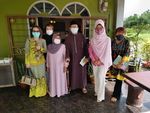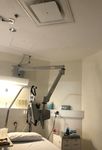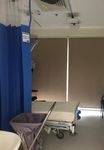G-TRAC News - Faculty of Health and Medical Sciences
←
→
Page content transcription
If your browser does not render page correctly, please read the page content below
Autumn 2020
G-TRAC News
Director Update
It is hard to believe that it is already May 2021. We have
continued as a centre to be involved in exciting research
benefiting older people in Australia and overseas.
Our international students have done us proud with Dr
Lalit Yadav joining us in April having submitted his PhD
Thesis, and Dr Sally Ahip pioneering a frailty clinic
program in her state, Sarawak, in Malaysia.
We welcomed new medical students to the G-TRAC
centre in January and we are excited to see what the rest
Pictured: Director Prof Renuka Visvanathan (left) speaks to new
of this year will hold.
medical students during orientation.
Mobile x-rays can be used in residential aged care
Dr Joanne Dollard investigates perspectives on mobile x-rays
Older people living in residential aged care may need an x-ray
to assess for problems they might experience, for example
after falling. To have the x-ray, they might be taken by family or
non-urgent ambulance to a community x-ray service or to the
hospital emergency department. For some older people living
in residential aged care and their families, this is an experience
they might prefer to avoid.
Do you know about mobile x-ray services? X-rays can actually
be taken in the comfort and security of resident’s own room,
which can prevent residents needing to be transferred to
hospital if their condition can be managed in the residential
aged care facility. A radiologist drives a mobile x-ray in the Left to right: Dr Joanne Dollard and Mr Lalit Yadav
back of a van around the city, going from appointment to
appointment, with an added cost of a call out fee. In 2019 the Australian Government introduced a MBS
item - to assist in covering the call out fee of a mobile x-ray service (for specific conditions after being seen
by a doctor).
We were funded by the Medical Research Future Fund to explore with residents, family members and
stakeholders their perspectives on mobile x-ray services. Understanding the views of people who might
benefit from this service is important. To date, we have interviewed 17 residents and 20 family carers from
four residential aged care facilities, and 22 stakeholders. Stay posted for our analysis of the interviews,
which we hope to share soon.
The project investigators from G-TRAC are Professor Renuka Visvanathan, Dr Joanne Dollard, Dr Jane
Edwards and Mr Lalit Yadiv.
1Investigating indoor environment quality for patients
Professor Veronica Soebarto & Summer Research Scholar Li Wen Lam conduct research in Geriatric
Evaluation and Management ward
A feasibility study has recently been conducted to investigate aspects of the
indoor environment quality in the Geriatric Evaluation and Management
(GEM) unit at The Queen Elizabeth Hospital. The study was undertaken by Li
Wen Lam (Elli), a Summer Research Scholar from The Faculty of
Engineering, Computer and Mathematical Sciences, under the supervision of
Professor Veronica Soebarto from the School of Architecture and Built
Environment, and Professor Renuka Visvanathan.
The study employed both quantitative method (measurements of indoor
temperatures and humidity, air movement, illumination and noise levels) and
qualitative methods (interview and thermal comfort survey particularly with
patients and some staff).
The study found that wearing many layers of clothing was the main defence Prof Veronica Soebarto
mechanism for the patients to feel comfortable in their ward. While the temperature in the ward was initially
thought to be the main cause of thermal discomfort, the study found that it was the air velocity from the air-
conditioning that caused the patients to feel ‘cool’ of ‘cold’ in the ward.
Light and noise levels were not found to have a significant impact on the patients’ comfort; however,
windows do play an important role in keeping the patients feel comfortable in the room.
It is expected that this feasibility study can be followed up with a larger study. The initial results are also
expected to provide useful information to the hospital management on ways to improve the indoor
environment quality of the ward in order to improve the patients’ experience and wellbeing.
Pictured: The air flow from the air-conditioning placed above or near the bed was
found to be the main problem causing thermal discomfort among patients.
2 3
2Prime Minister Of Malaysia, Tan Sri Muhyiddin Bin Yassin’s Visit PhD
Candidate Dr Sally Ahip’s Clinic
On 2nd April 2021 Dr Sally Suriani Ahip was part of the Prime Minister’s entourage.
Dr Sally Suriani Ahip, Family Physician with the Ministry
of Health Malaysia and PhD candidate with the CRE in
Frailty and Healthy Ageing was invited to be part of
Malaysian Prime Minister Muhyiddin Yassin’s entourage
during his recent visit to Sarawak on the 2nd of April
2021.
The Prime Minister visited communities and met an
elderly couple who were both frail and dependent, and
had undergone a frailty intervention program under the
GeKo (Geriatrik Komuniti / Community Geriatrics) Unit,
which was founded by Dr Sally in October 2019. Dr Ahip Prime Minister Muhyiddin gives an opening address to state political
took her learnings from Adelaide and translated this to leaders, community leaders, local media discussing the government’s
benefit older Malaysian in her community. commitment in combating the Covid 19 pandemic in Malaysia.
Dr Sally Ahip gave a presentation to the Sarawak State
Chief Minister and Deputy Chief Minister, Minister of
Welfare, Community Well Being, Women, Family and
Childhood Development (Sarawak), Director of Welfare
Department (Sarawak) and the Member of Parliament for
Samarahan constituency. She discussed the importance
of early frailty detection as well as timely and targeted
interventions to reverse frailty.
For this couple, their diligence and commitment to GeKo
interventions have reversed their frailty and they both
have regained their physical independence. Their
daughter had quit her job to become a full time carer for L-R: Prime Minister Muhyiddin with Dr Sally Ahip, nurse Sarimah and
her frail parents but because they improved following the public health medical officer DR Joyoki.
GoKo interventions she was able to return to work.
Dr Sally Ahip seated, left, Prime minister Yassin seated front centre and the L-R: Dr Sally Ahip, Arni (patient’s daughter), patients Hajah Patani & Haji Aris,
media frenzy. Dato Sri Hajah Fatimah Abdullah (Minister of Welfare, Community Well Being,
Women, Family & Childhood Development) & Arita (patient’s daughter).
3Frailty in Residential Sector over Time (FIRST) Study
Dr Agathe Daria Jadczak leads a study on frailty in residential care sector
Residential aged care services have recently been in the spotlight, not only because of the COVID-19
pandemic, but also due to the Royal Commission that was underway to provide recommendations to the
government on how to improve the quality of aged care services in Australia.
Research into aged care is crucial to provide much needed information on the health and wellbeing of our
aged care residents, and the quality of care.
The Centre of Research Excellence Frailty and Healthy Ageing in cooperation with Resthaven Inc. is
conducting a study to examine the health of residential aged care residents across South Australia. The
study is collecting important health data over 3 years to better determine the prevalence and progression of
frailty, associated health outcomes and health care costs. The results of the study will assist in developing
interventions that can help to improve the health and wellbeing of residents living in residential aged care
services.
Front row left to right: Terry Shortt, Victoria Foy, Kim Testi and Jean Zhang. Back row left to right: Leonie Robson, Tina Cooper,
Renuka Visvanathan and Agathe Daria Jadczak
Early results suggest that residential aged care services are increasingly being called upon to manage very
frail older residents, many of whom have geriatric syndromes such as dementia. To provide a more
appropriate response, staff will need to be better skilled in the management of geriatric syndromes
including frailty, and funding bodies will need to support the better management of these conditions.
Data related to other health outcomes, such as residents’ medical diagnoses, pain, medicines, doctor and
hospital visits, nutritional status, sarcopenia risk, number of falls, dementia, quality of life, anxiety and
depression, sleep quality, satisfaction with care, activities of daily living, and the use of life space are
currently being analysed, and results will be available to the public soon.
Contact Us G-TRAC at Paradise G-TRAC at Woodville
Telephone: +61 8 8313 2144 61 Silkes Rd (Entrance 2) c/o Aged & Extended Care Services, Level 8B
Fax: +61 8313 2155 The Queen Elizabeth Hospital
4
Paradise SA 5075
email: gtrac@adelaide.edu.au 28 Woodville Road, Woodville South, SA 5011You can also read



























































